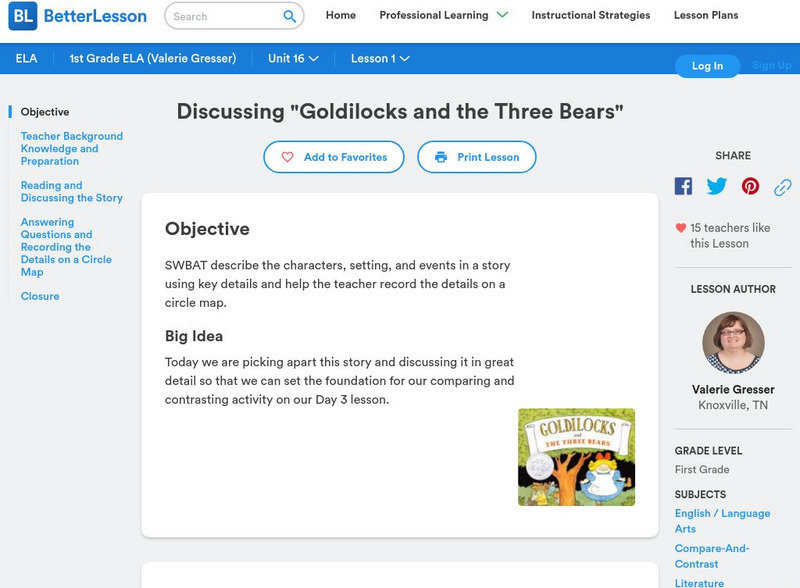Better Lesson
Better Lesson: Kicking Off the Year With Counting
SWBAT match a numeral with its written digit form for numbers below 20 and learn the meaning of digit and numeral.
Better Lesson
Better Lesson: Math Hunt Part 2
SWBAT take the data from class and home and create comparisons of the different ways math is used by adults.
Better Lesson
Better Lesson: Missing Numbers to 50
SWBAT use patterns on a 50 chart to identify missing numbers.
Better Lesson
Better Lesson: Wanted: Runaway Number
SWBAT describe numbers using base ten language, models and number charts.
Better Lesson
Better Lesson: How Are They Different?
SWBAT order a set of numbers and quantities up to 12 and compare two quantities up to 10 to see which one is greater. The students will also demonstrate their knowledge of how the numbers in the counting sequence are related (that each...
Better Lesson
Better Lesson: How Many in Your Box?
SWBAT make a connection between number names and written numbers to the quantities they represent. They will also practice ordering numbers and quantities up to 12. Students will also document a solution to a problem
Better Lesson
Better Lesson: Building Towers
SWBAT count a set of up to 20 objects by 1's. SWBAT use number names and written numbers to label the quantities they represent. SWBAT order a set of numbers and quantities up to 12.
Better Lesson
Better Lesson: Ordering Numbers: Unit Review and Test
SWBAT share their knowledge through the assessment provided
Better Lesson
Better Lesson: Vocabulary Review/ Written & Oral Math Language Lesson Plan
SWBAT use math vocabulary to describe relationships between numbers.
Better Lesson
Better Lesson: Problem Solving: Act It Out
SWBAT use objects to act out ordering numbers to solve story problems.
Better Lesson
Better Lesson: Start At/stop At
SWBAT practice the rote counting sequence both forwards and backwards, from 1-30. SWBAT use a number line as a tool for counting. SWBAT count sets of objects up to 20.
Better Lesson
Better Lesson: Building Tens at the Lego Factory
SWBAT create a number using groups of tens and extra ones.
Better Lesson
Better Lesson: It's Elementary My Dear Watson
SWBAT identify and build numbers based on base ten language.
Better Lesson
Better Lesson: Tremendous Triangles!
Students will be able to practice working with triangles in different orientations, students will illustrate a "real world" triangular object, & build craft stick triangles.
Better Lesson
Better Lesson: Super Squares!
This lesson provides an overview of squares, along with a chance to create actual squares and an opportunity to illustrate objects shaped like squares.
Better Lesson
Better Lesson: Subtraction Number Stories Day 2
Students will be able to create their own number stories and represent them using one of the methods we have learned in this unit.
Better Lesson
Better Lesson: Hopping Up & Down the Number Line
SWBAT identify the subtraction and addition sign and understand their function by hopping a bunny up and down a number line.
Better Lesson
Better Lesson: Meet Allie the Alligator
Students will determine if numbers in a set are: greater than, less than, or equal to.
Better Lesson
Better Lesson: Subtraction Number Stories Day 1
Students will be able to create their own number stories and represent them using one of the methods we have learned in this unit.
Better Lesson
Better Lesson: I Am Five! Exploring the Number Five
Students will be able to identify the number five, identify groups with five objects and represent the number five.
Better Lesson
Better Lesson: Cause & Effect With "Why Mosquitoes Buzz in People's Ears" Day 4
We are finishing up the story today. Today we are finishing analyzing the story by thinking about how the events and characters developed by the end of the text.
Better Lesson
Better Lesson: Discussing "Goldilocks and the Three Bears"
Today we are picking apart this story and discussing it in great detail so that we can set the foundation for our comparing and contrasting activity on our Day 3 lesson.
Better Lesson
Better Lesson: Sorting by Size
Sorting is an important foundational skills for kindergarten students to learn. Using attribute blocks to sort by size helps students practice comparing objects and prepares them to sort by other measurable attributes.
Better Lesson
Better Lesson: Sorting by Shape
Sorting is an important foundational skills for kindergarten students to learn. Using attribute blocks to sort by shape helps students practice comparing objects and prepares them to sort measurable attributes.




